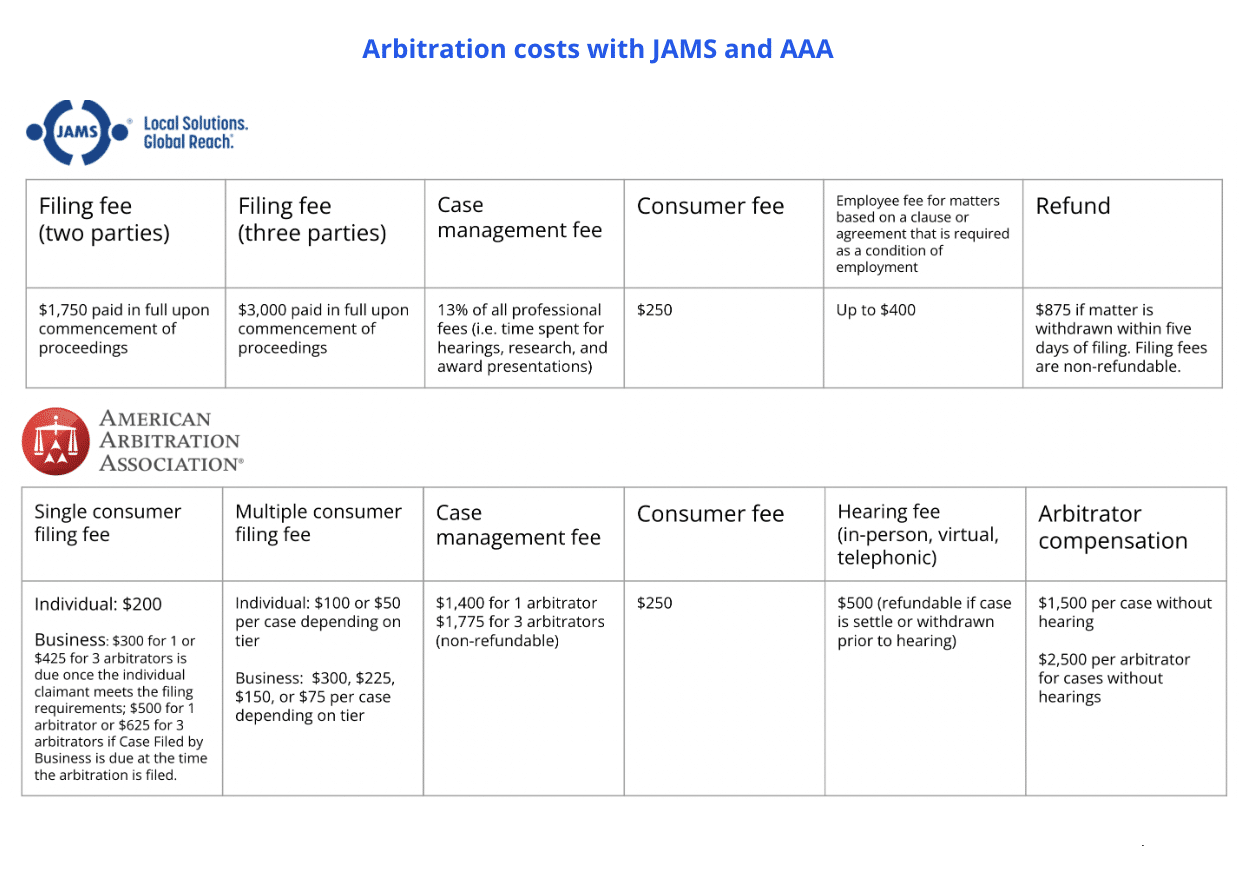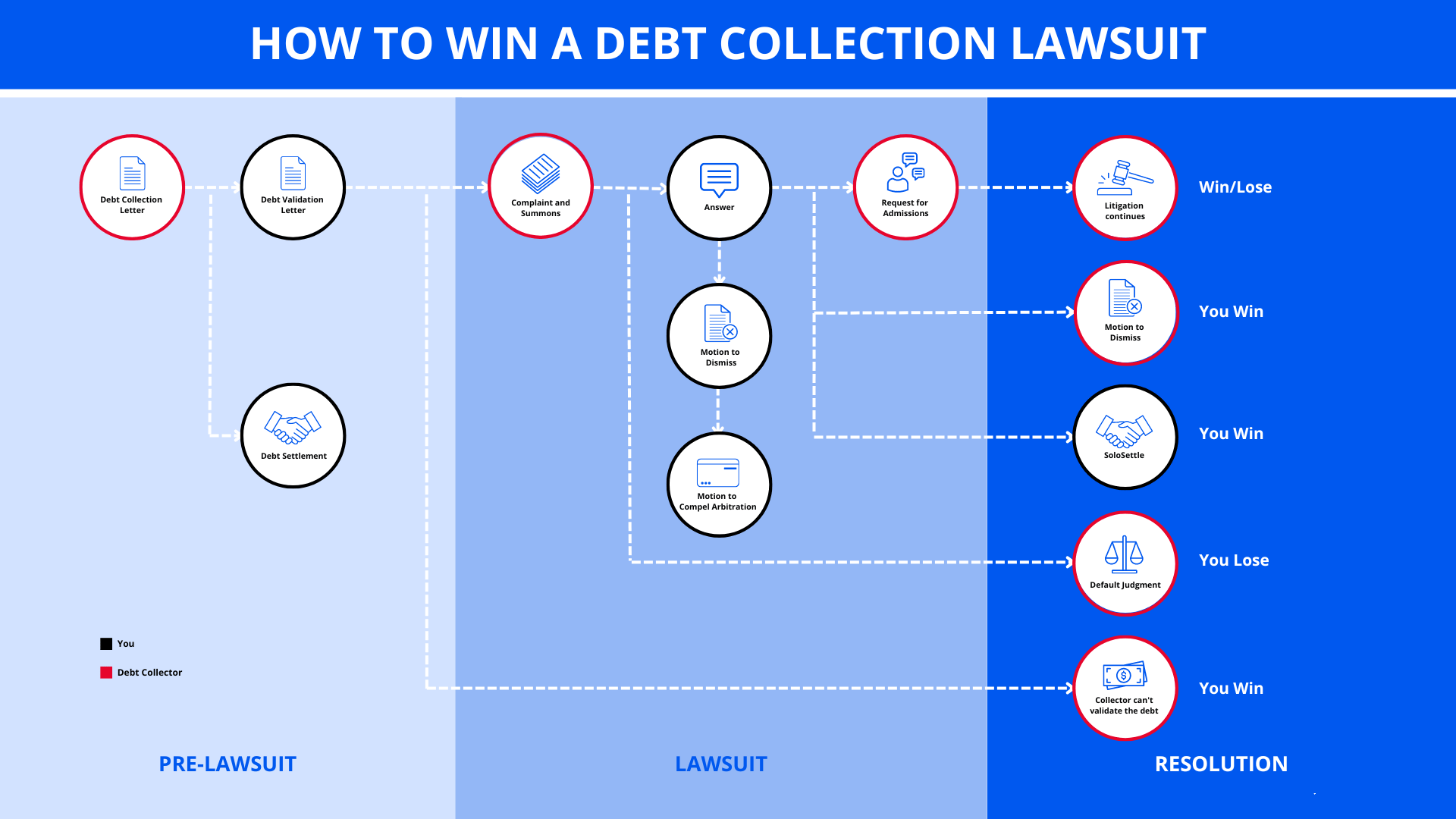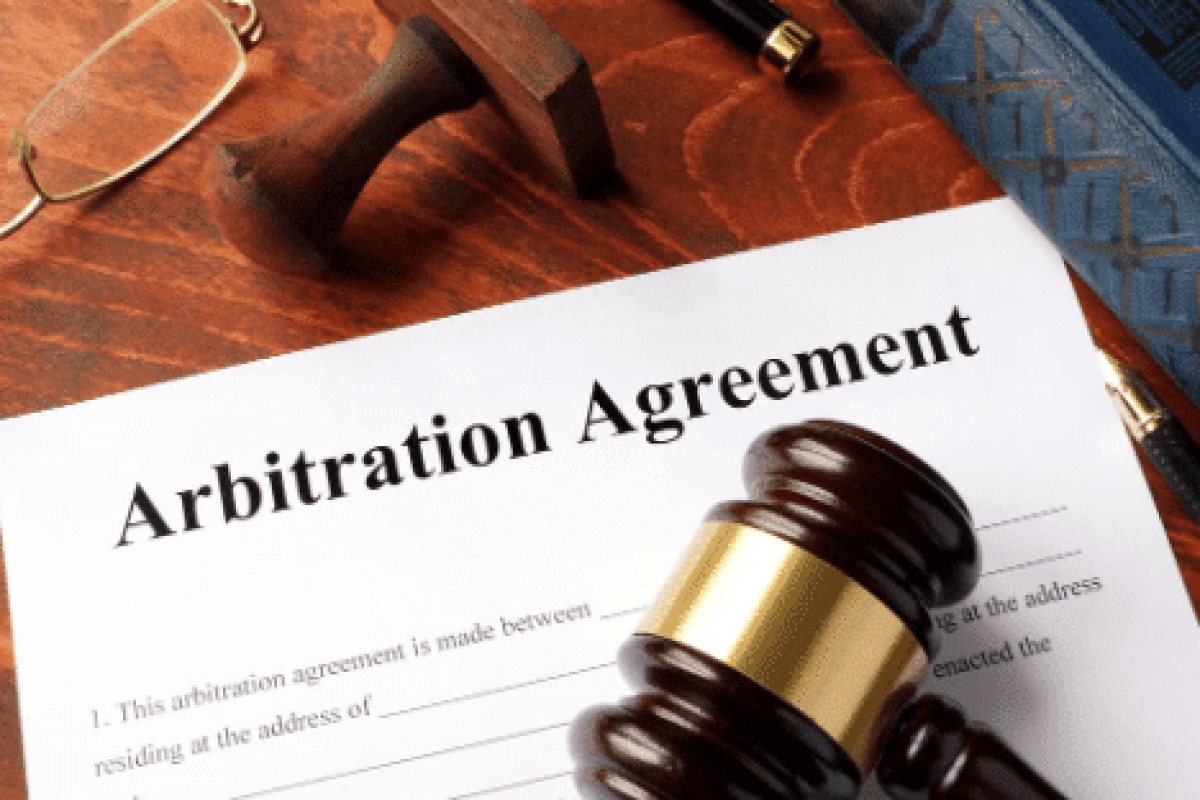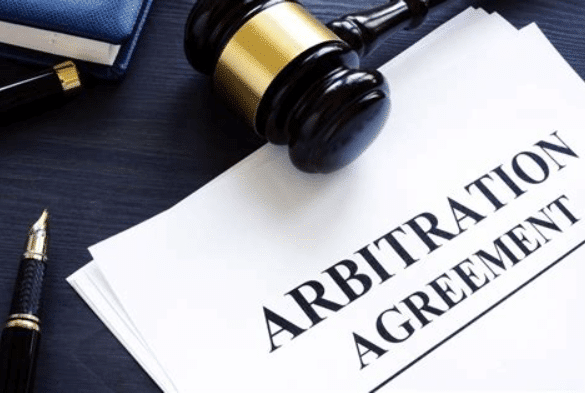If your credit card agreement contains an arbitration clause, you can file a Motion to Compel Arbitration to settle your debt outside of court and through arbitration instead. Use a sample Motion to Compel Arbitration or let the ZumaZip software draft a customized Motion to Compel Arbitration for you.
A motion requests the court for a specific ruling, direction, or order. One such motion is the Motion to Compel Arbitration. You can compel arbitration as long as you have a valid and enforceable written agreement to force the other party to submit the dispute to arbitration.
For instance, if a debt collector sues you, you can file a Motion to Compel Arbitration to avoid going to court or delay the court process.
Arbitration can either be binding or non-binding. Binding arbitration means that the decision made by the arbitrator is final and can be enforced in court. On the other hand, when arbitration is non-binding, it means that the decision made by the arbitrator is just a recommendation and can only be enforceable if both parties accept the recommendation.
If a complaint contains arbitrable and non-arbitrable claims, the court can’t deny a Motion to Compel Arbitration even if the litigation involves non-arbitrable issues. The court can only deny a petition for arbitration if the non-arbitrable issues are outside the scope of the parties.
How to file a Motion to Compel Arbitration
Before initiating a Motion to Compel Arbitration, it is imperative to ensure compliance with the requisite conditions for arbitration. Presented below are recommendations for effectively filing a petition to compel arbitration:
- Verify the existence of a valid arbitration agreement: The foundational requirement for pursuing a Motion to Compel Arbitration is the presence of a valid arbitration agreement. It is essential to meticulously review the contractual arrangement with the counterparty to ascertain the existence of such an agreement, including confirmation of mutual signatures if applicable.
- Confirm alignment with the arbitration provision: Certain agreements delineate between arbitrable and non-arbitrable issues. Prior to initiating a Motion to Compel Arbitration, it is crucial to ascertain whether the subject matter of the dispute falls within the purview of the arbitration agreement. This involves examining any exceptions or specifications outlined within the agreement.
- Establish the designated arbitration venue: Upon establishing eligibility for arbitration, identification of the predetermined arbitration venue becomes paramount. Subsequently, the Motion to Compel Arbitration should be filed in the jurisdiction specified within the arbitration provision, typically delineated within the contractual terms.
- Solicit legal counsel: Engaging the services of a competent attorney proficient in arbitration matters is advisable. Legal counsel can offer expert guidance on strategizing and executing the Motion to Compel Arbitration in adherence to legal protocols and best practices.
- Determine the appropriate court for petition filing: While federal courts generally exhibit a proclivity towards arbitration, the selection of the court for petition filing necessitates consideration of various factors. While federal courts are generally favorable towards arbitration, the acceptance of a case is not guaranteed. Hence, careful deliberation is required before determining the court for filing the motion.
Here are a few circumstances in your case that may allow you to file in a federal court:
- If you and the other party are from different states.
- If the dispute is worth at least $75000.
However, if it’s impossible to file in a federal court, you can still go ahead and file in a state court.
Use ZumaZip to file a response to a debt collection lawsuit fast.
Draft a Motion to Compel Arbitration. Section 4 of the Federal Arbitration Act (FAA) allows you to file a Motion to Compel Arbitration even if the plaintiff hasn’t filed a lawsuit against you. For this reason, you can go ahead and draft your motion. Ensure the information contained in the draft includes:
- A title, e.g., Motion to Compel Arbitration.
- The arbitration clause in the agreement.
- Identities of both parties involved in the lawsuit.
- The states you both come from.
- Explain how the court has jurisdiction over the case.
- Request the court to issue an order that both parties must resort to arbitration.
- Sign the motion. If you have an attorney, both of you need to sign the motion before filing it with the court.
Check out an example of our Motion to Compel Arbitration here.
To proceed with the Motion to Compel Arbitration, the following steps are necessary:
- File the Motion with the Court Clerk: Following the drafting of the Motion to Compel Arbitration, it must be formally filed with the court clerk. This can be done either in person or through legal representation by an attorney, if engaged. It’s imperative to familiarize oneself with the specific filing requirements stipulated by the respective court, and therefore consulting with the court clerk regarding local filing rules applicable to the case is essential.
- Determine Filing Fee and Payment Methods: Prior to filing, it’s advisable to ascertain the filing fee from the court clerk and inquire about acceptable payment methods. This ensures compliance with financial obligations associated with the filing process.
- Schedule a Hearing: Concurrently with the petition filing, scheduling a hearing is imperative. The filing of the petition serves as formal notice, indicating that a hearing can be convened five days subsequent to the filing date. This ensures that procedural timelines are adhered to in accordance with legal requirements.
- Serve Notice of Motion to the Other Party: After the Motion has been filed with the court, it is incumbent upon the filer to serve the opposing party with a notice of the motion. This involves providing copies of pertinent documents, including the complaint, notice of hearing, and any summons issued by the court. Notably, the service of notice can only commence subsequent to the filing of the motion with the court. The court may provide a summons document to be presented to the other party, which may require completion before service. It is essential to comply with all procedural requirements to ensure due process and legal validity.
If you’ve filed your case in a federal court, you can serve the notice to the other party by:
- Hiring a private process server to do it for you.
- Using someone the age of 18 or above and is not involved in the lawsuit.
Attend the court hearing.
Attending the court hearing is crucial, as it is the forum where the validity of the arbitration agreement will be adjudicated by the presiding judge. If the arbitration agreement is deemed valid, the judge has the authority to issue an order compelling arbitration. Conversely, if the agreement is deemed invalid, the judge may opt for trial proceedings.
The decision to file a Motion to Compel Arbitration is contingent upon the specific circumstances of the case. Nonetheless, adherence to certain prerequisites is imperative, notably the presence of a valid arbitration agreement prior to initiating such a motion in court. By ensuring compliance with these prerequisites, the filer can navigate the legal process effectively and pursue the appropriate course of action in alignment with legal standards and procedural requirements.
Learn more from our guide on How to Make a Motion to Compel Arbitration at ZumaZip.com.
What happens after I file a Motion to Compel Arbitration?
The filing of a Motion to Compel Arbitration may yield various outcomes, including:
- Denial of Motion by the Court: If the court rejects the motion, the case proceeds to a regular hearing or trial within the court’s jurisdiction.
- Acceptance of Motion Leading to Arbitration: Should the court accept the motion, the case transitions to arbitration proceedings. In this scenario, both parties engage an arbitrator to facilitate resolution.
- Voluntary Dismissal by Opposing Party: Alternatively, the opposing party may opt to dismiss the case, providing an opportunity for the parties to negotiate a settlement outside of court.
Filing a Motion to Compel Arbitration can be advantageous, particularly in debt-related lawsuits. In many instances, debt collectors may be obliged to cover arbitration expenses, potentially surpassing the amount they seek to recover. Consequently, they may opt to dismiss the case rather than proceed with arbitration, representing a favorable outcome for the defendant.
However, if the arbitration clause mandates the equitable division of arbitration costs between parties, the likelihood of case dismissal may diminish. It underscores the importance of carefully reviewing the terms of the arbitration agreement and assessing potential financial implications before pursuing arbitration as a legal strategy.
JAMS Solutions and American Arbitration Association (AAA) are two of the leading arbitration organizations in the US. If your Motion to Compel Arbitration has been accepted by the court, it is very likely that your arbitration case will involve one of these two organizations.
According to JAMS, the arbitration process is as follows: Both parties choose an impartial person (arbitrator) who arbitrates the case by reading briefs and documentary evidence, listening to parties’ testimonies, examine evidence, and offering an “award of the arbitrator” (which includes any relief, damages, outcome, or attorney/courts costs and fees deemed necessary by the arbitrator). The arbitrator must render the award within 30 days of the arbitration hearing. Finally, the award can be entered as a judgment in law after proper confirmation with the court.
Who pays for arbitration?
Indeed, numerous credit agreements designate the creditor as the party responsible for arbitration fees should a debt lawsuit proceed to arbitration. This contractual obligation often absolves you from financial liability for arbitration expenses, providing a significant advantage.
However, in cases where the credit agreement lacks explicit provisions assigning responsibility for arbitration fees, the default arrangement typically entails the sharing of arbitration costs between you and the creditor. This underscores the importance of thorough review and understanding of the credit agreement’s terms before pursuing arbitration as a legal strategy.
It’s noteworthy that in arbitration disputes between an employee and employer, the burden of covering arbitration costs typically falls on the employer, although they reserve the right to seek reimbursement if successful.
Furthermore, it’s essential to scrutinize the credit agreement carefully, as some agreements grant the creditor the entitlement to recover arbitration fees in the event of a favorable outcome. By familiarizing yourself with the terms of the credit agreement, you can make informed decisions regarding arbitration proceedings and mitigate potential financial implications.
See the table below for JAMS’ filing fees and AAA’s filing fees:

Debt collection lawsuit flowchart
This flowchart outlines all the possible routes you can take if you’ve been sued for debt:

What is ZumaZip?
ZumaZip is a convenient solution designed to streamline your response to a debt collection lawsuit. Here’s a breakdown of what you can expect when you use ZumaZip:
Firstly, you’ll access our user-friendly web application, which guides you through the process step by step. You’ll be prompted to answer a series of questions related to your specific situation. Once you’ve completed the questionnaire, you have the option to either print out the finalized forms and mail them to the appropriate courts yourself, or you can opt to utilize ZumaZip’s services to file them on your behalf. Additionally, if you choose this option, an attorney will review your document for added peace of mind.
If you’re seeking guidance on how to effectively respond to a debt collection lawsuit, ZumaZip can provide the assistance you need. Feel free to explore our FAQs for more information on what ZumaZip has to offer.
What if I haven’t been sued yet?
If you’ve only received a collections notice, but not a lawsuit, the best way to respond is with a Debt Validation Letter. When a debt collector contacts you in any way, whether it’s by phone or mail, you can respond by formally requesting a debt validation with a Debt Validation Letter . This letter notifies the collector that you dispute the debt and forces them to provide proof you owe the debt. They can’t call you or continue collecting until they provide validation of the debt. This flowchart shows how you can use a Debt Validation Letter to win.
Get started with a Debt Validation Letter here.
How to Answer a Summons for debt collection in all 50 states
Here’s a list of guides on how to respond to a debt collection lawsuit in each state:
- Alabama
- Alaska
- Arizona
- Arkansas
- California
- Colorado
- Connecticut
- Delaware
- Florida
- Georgia
- Hawaii
- Idaho
- Illinois
- Indiana
- Iowa
- Kansas
- Kentucky
- Louisiana
- Maine
- Maryland
- Massachusetts
- Michigan
- Minnesota
- Mississippi
- Missouri
- Montana
- Nebraska
- Nevada
- New Hampshire
- New Jersey
- New Mexico
- New York
- North Carolina
- North Dakota
- Ohio
- Oklahoma
- Oregon
- Pennsylvania
- Rhode Island
- South Carolina
- South Dakota
- Tennessee
- Texas
- Utah
- Vermont; Vermont (Small Claims court)
- Virginia
- Washington
- West Virginia
- Wisconsin
- Wyoming
Guides on how to beat every debt collector
Hey there! Facing off against a debt collector can feel like a daunting challenge, but fear not! We’re here to help you navigate through it all with our handy guides designed to assist you in beating every debt collector you encounter. Whether you’re facing a new lawsuit or dealing with a persistent collector, we’ve got your back. Stay positive, stay informed, and let’s tackle this together!
- Absolute Resolutions Investments LLC
- Accredited Collection Services
- Alliance One
- Amcol Clmbia
- American Recovery Service
- Asset Acceptance LLC
- Asset Recovery Solutions
- Associated Credit Services
- Autovest LLC
- Cach LLC
- Cavalry SPV I LLC
- Cerastes LLC
- Colinfobur
- Covington Credit
- Crown Asset Management
- CTC Debt Collector
- Cypress Financial Recoveries
- Delanor Kemper & Associates
- Eagle Loan of Ohio
- Educap
- Estate Information Services
- FIA Card Services
- Forster & Garbus
- Freshview Solutions
- Fulton Friedman & Gullace LLP
- Harvest Credit Management
- Howard Lee Schiff
- Hudson & Keyse LLC
- Integras Capital Recovery LLC
- Javitch Block
- Jefferson Capital Systems LLC
- LVNV Funding
- Mannbracken
- Mariner Finance
- Medicredit
- Michael J Adams PC
- Michael J Scott
- Midland Funding LLC
- Mullooly, Jeffrey, Rooney & Flynn
- Mountain Land Collections
- MRS Associates
- National Collegiate Trust
- Nationstar Foreclosure
- Northstar Capital Acquisition
- NCEP LLC
- NRC Collection Agency
- OneMain Financial
- Palisades Collection LLC
- Pallida LLC
- Paragon Revenue Group
- Pinnacle Collections Agency
- PMAB LLC
- Portfolio Recovery Associates
- Provest Law
- PYOD LLC
- Reunion Student Loan Finance Corporation
- Revenue Group
- Regents and Associates
- RSIEH
- Salander Enterprises LLC
- Second Round Sub LLC
- Security Credit Services
- Sherman Financial Group
- Suttell and Hammer
- T-Mobile
- Transworld Systems
- Tulsa Teachers Credit Union
- UCB Collection
- Velo Law Office
- Velocity Investments
- Waypoint Resource Group
- Weinberg and Associates
- Wolpoff & Abramson
Settle your medical debt
Having a health challenge is stressful, but dealing medical debt on top of it is overwhelming. Here are some resources on how to manage medical debt.
- Am I Responsible for My Spouse’s Medical Debt?
- Do I Need a Lawyer for Medical Bills?
- Do I Need a Lawyer to Fight Medical Bill Debt?
- Does Bankruptcy Clear Medical Debt?
- How Much Do Collection Agencies Pay for Medical Debt?
- How to Find Medical Debt Forgiveness Programs
- Is There a Statute of Limitations on Medical Bills?
- Medical Debt Statute of Limitations by State
- Summoned to Court for Medical Bills — What Do I Do?
- Summoned to Court for Medical Bills? What to Do Next
Stop calls from Debt Collectors
Do you keep getting calls from an unknown number, only to realize that it’s a debt collector on the other line? If you’ve been called by any of the following numbers, chances are you have collectors coming after you, and we’ll tell you how to stop them.
- 800-390-7584
- 800-289-8004
- 800-955-6600
- 877-366-0169
- 877-591-0747
- 800-278-2420
- 800-604-0064
- 800-846-6406
- 877-317-0948
- 888-899-4332
- 888-912-7925
- 202-367-9070
- 502-267-7522
Other wage garnishment resources
- Bank Account Garnishment and Liens in Texas
- Can I Stop Wage Garnishment?
- Can My Wife’s Bank Account Be Garnished for My Debt?
- Can Payday Loans Garnish Your Wages?
- Can pensions be garnished?
- Can Private Disability Payments Be Garnished?
- Can Social Security Disability Be Garnished?
- Can They Garnish Your Wages for Credit Card Debt?
- Can You Stop a Garnishment Once It Starts?
- Guide to Garnishment Limits by State
- How Can I Stop Wage Garnishments Immediately?
- How Long Before a Creditor Can Garnish Wages?
- How Long Does It Take to Get Garnished Wages Back?
- How to Fight a Wage Garnishment
- How to Prevent Wage Garnishment
- How to Stop a Garnishment
- How to Stop Social Security Wage Garnishment
- How to Stop Wage Garnishment — Everything You Need to Know
- New York Garnishment Laws – Overview
- Ohio Garnishment Laws — What They Say
- Wage Garnishment Lawyer
- What Is Wage Garnishment?
Guides on Arbitration
If the thought of going to court stresses you out, you’re not alone. Many Americans who are sued for credit card debt utilize a Motion to Compel Arbitration to push their case out of court and into arbitration.
Below are some resources on how to use an arbitration clause to your advantage and win a debt lawsuit.
- How Arbitration Works
- How to Find an Arbitration Clause in Your Credit Agreement
- How to Make a Motion to Compel Arbitration
- How to Make a Motion to Compel Arbitration in Florida
- How to Make a Motion to Compel Arbitration Without an Attorney
- How Credit Card Arbitration Works
- Motion to Compel Arbitration in California
- Sample Motion to Compel Arbitration
Federal Debt Collection Laws Can Protect You
Knowing your rights makes it easier to stand up for your rights. Below, we’ve compiled all our articles on federal debt collection laws that protect you from unfair practices.
- 15 USC 1692 Explained
- Does the Fair Credit Reporting Act Work in Florida?
- FDCPA Violations List
- How to File an FDCPA Complaint Against Your Debt Collector (Ultimate Guide)
- How to Make a Fair Debt Collection Practices Act Demand Letter
- How to Submit a Transunion Dispute
- How to Submit an Equifax Dispute
- How to Submit an Experian Dispute
- What Debt Collectors Cannot Do — FDCPA Explained
- What Does Account Information Disputed by Consumer Meets FCRA Requirements Mean?
- What does “meets FCRA requirements” mean?
- What does FCRA stand for?
- What is the Consumer Credit Protection Act
Resolve Your Debt with Your Creditor
Some creditors, banks, and lenders have an internal collections department. If they come after you for a debt, ZumaZip can still help you respond and resolve the debt. Here’s a list of guides on how to resolve debt with different creditors.
- American Express; American Express – Debt Collection
- Bank of America
- Barclay
- Best Buy Credit Card
- Capital One
- Chase
- Credit One Bank
- Old Navy Credit Card
- PayPal Synchrony Card
- Regional Finance
- Retailers National Bank
- Reunion Student Loan Finance Corporation
- SYNCB/PPEXTR
- Synchrony Bank
- Synchrony Walmart Card
- Target National Bank
- Webbank
- Wells Fargo
- Can I Pay My Original Creditor Instead of a Debt Collection Agency?
- Can I Settle a Debt with the Original Creditor?
Check the Status of Your Court Case
Don’t have time to go to your local courthouse to check the status of your case? We’ve created a guide on how to check the status of your case in every state, complete with online search tools and court directories.
- Alabama Court Case Search—Find Your Lawsuit
- Alaska Court Case Search — Find Your Lawsuit
- Arizona Court Case Search – Find Your Lawsuit
- Arkansas Court Case Search — Find Your Lawsuit
- California Court Case Search- Find Your Lawsuit
- Colorado Court Case Search — Find Your Lawsuit
- Connecticut Case Lookup — Find Your Court Case
- Delaware Court Case Search — Find Your Lawsuit
- Florida Court Case Search — Find Your Lawsuit
- Georgia Court Case Search — Find Your Lawsuit
- Hawaii Court Case Search — Find Your Lawsuit
- Idaho Court Case Search – Find Your Lawsuit
- Illinois Court Case Search — Find Your Lawsuit
- Indiana Court Case Search — Find Your Lawsuit
- Iowa Court Case Search — Find Your Lawsuit
- Kansas Court Case Search — Find Your Lawsuit
- Kentucky Court Case Search — Find Your Lawsuit
- Louisiana Court Case Search — Find Your Lawsuit
- Maine Court Case Search — Find Your Lawsuit
- Maryland Court Case Search — Find Your Lawsuit
- Massachusetts Court Case Search — Find Your Lawsuit
- Michigan Court Case Search — Find Your Lawsuit
- Minnesota Court Case Search — Find Your Lawsuit
- Mississippi Court Case Search — Find Your Lawsuit
- Missouri Court Case Search — Find Your Lawsuit
- Montana Court Case Search — Find Your Lawsuit
- Nebraska Court Case Search — Find Your Lawsuit
- Nevada Court Case Search — Find Your Lawsuit
- New Hampshire Court Case Search — Find Your Lawsuit
- New Jersey Court Case Search—Find Your Lawsuit
- New Mexico Court Case Search – Find Your Lawsuit
- New York Case Search — Find Your Lawsuit
- North Carolina Court Case Search — Find Your Lawsuit
- North Dakota Court Case Search — Find Your Lawsuit
- Ohio Court Case Search — Find Your Lawsuit
- Oklahoma Court Case Search — Find Your Lawsuit
- Oregon Court Case Search — Find Your Lawsuit
- Pennsylvania Court Case Search — Find Your Lawsuit
- Rhode Island Court Case Search — Find Your Lawsuit
- South Carolina Court Case Search — Find Your Lawsuit
- South Dakota Court Case Search — Find Your Lawsuit
- Tennessee Court Case Search — Find Your Lawsuit
- Texas Court Case Search — Find Your Lawsuit
- Utah Court Case Search — Find Your Lawsuit
- Vermont Court Case Search — Find Your Lawsuit
- Virginia Court Case Search — Find Your Lawsuit
- Washington Court Case Search — Find Your Lawsuit
- West Virginia Court Case Search — Find Your Lawsuit
- Wisconsin Court Case Search — Find Your Lawsuit
- Wyoming Court Case Search — Find Your Lawsuit






























